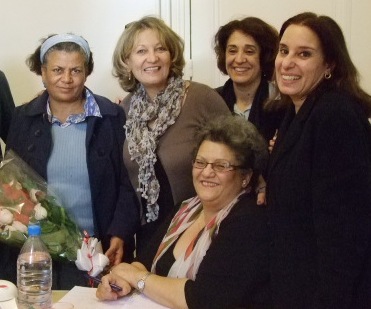IFEX-TMG members commend brave women journalists, activists, lawyers and judges who have never stopped calling for greater freedom of expression.
(IFEX-TMG) – 8 March 2011 – To mark the occasion of the 100th anniversary of International Women’s Day, on 8 March 2011, members of the International Freedom of Expression Exchange Tunisia Monitoring Group (IFEX-TMG), a coalition of 20 IFEX members, commend the brave women journalists, activists, lawyers and judges who never stopped calling for greater freedom of expression and human rights in Tunisia, despite efforts by the government to silence them through any means possible.
IFEX-TMG members send a message of solidarity to partner organisation the Tunisian Association of Democratic Women (Association tunisienne des femmes democrats, ATFD) and congratulate ATFD President Sana Ben Achour for standing strong despite targeted and relentless harassment while she carried out important work such as monitoring the media during the elections. On the occasion of International Women’s Day, IFEX-TMG members are sending symbolic roses to the ATFD, which is holding an event in Tunis on 12 and 13 March on “independent Tunisian women after the revolution”.
“We were struck by the ATFD’s dynamism, tenacity and sheer courage in speaking out against violence against women in the face of the extreme repression that Tunisian activists were facing at that time, weeks before the fall of Ben Ali,” said Tamsin Mitchell of PEN International. A December visit to Tunisia by Mitchell and IFEX-TMG Chair Rohan Jayasekera of Index on Censorship was shrouded by security concerns and the shadow of an oppressive government, whose heavy-handed censorship made it hard for independent voices to be heard.
“Over the past years, we have used the occasion of International Women’s Day to decry attacks on women in Tunisia, including slander and abuse faced by women journalists and activists in Tunisia,” says Jayasekera. “Happily, this year, we are celebrating the brave Tunisians who have helped turn the page towards a democracy where women can speak freely without fear of reprisal.”
In December, IFEX-TMG planned to work with the ATFD to address the sanctions against independent women judges from the Association of Tunisian Judges (AMT), such as secretary general Kalthoum Kennou, who were moved far away from their families and saw their salaries reduced as a result of their outspoken calls for an independent judiciary. Now we welcome the news that Kennou and other women judges have returned to their positions in Tunis, and we support them as they continue in their important work. In the past there have been myriad ways to silence free expression, like jailing outspoken journalists, but Kennou and her colleagues are committed to working to ensure judges are not compromised when dealing with criminal cases brought wrongfully against members of the media.
While Tunisia indeed has a long history of promoting women’s rights since they were enshrined in the 1950s, they were not fully protected since the reign of President Zine El Abidine Ben Ali began in 1987. Formal protections of women’s rights under the constitution were used to disguise oppressive measures by the regime, even fooling Western diplomats into taking a more measured approach with the regime.
The country’s poor treatment of outspoken women has made its advances in women’s rights appear as empty rhetoric. Pro-government media were harnessed to abuse women journalists and activists since 2008, calling women who dared to criticise the Ben Ali regime “prostitutes” or “traitors on the payroll of foreign governments or groups”. Among those persecuted have been women partners of the IFEX-TMG including journalists Sihem Bensedrine and Naziha Rejiba of Observatoire de la Liberté de la Presse, de L’Edition et de la Création (OLPEC), an IFEX member. One of the goals of the IFEX-TMG and its partners will be to work towards media reform where media act ethically and don’t engage in slander and defamation.
“When a country goes through a momentous revolution such as Tunisia has just done, and benefited largely by women’s participation, the new rulers should not ignore women’s interests and variety of roles they could play in building a new country where free expression and human rights are enjoyed by all,” comments writer Elisabeth Eide of Norwegian PEN. Women journalists should be able to write freely about new developments without fear of harassment, jail or other attacks.
For more on IFEX-TMG, visit http://ifex.org/tunisia/tmg/ or find IFEX-TMG at http://www.facebook.com/IFEXTMG and on Twitter @TunisiaMonitor



